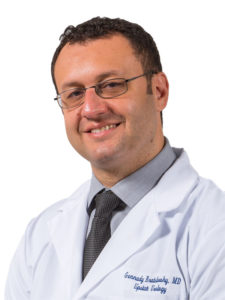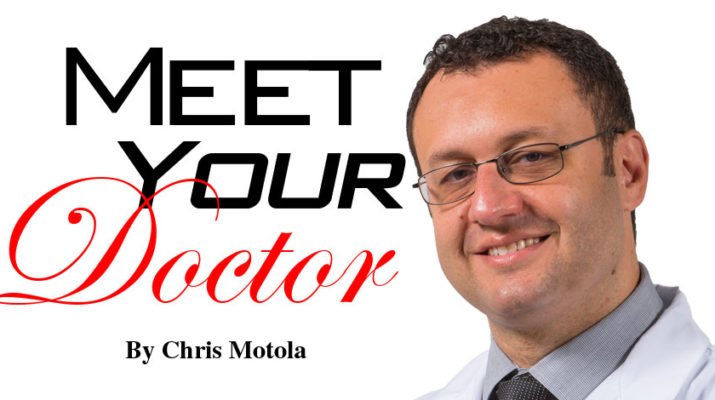Thanks to a high number of specialists, robotic platforms and new procedures — such as gender affirmation surgeries — Upstate Urology is attracting growing number of patients, including from overseas
By Chris Motola

Q: You and I have spoken a couple times in the past. Quite a bit seems to have changed since then. At the time, you were one of the few urologists in the area. Now you have a large team and are pulling in patients from well outside Central New York and even Upstate New York. You’ve developed a pretty big reputation.
A: I certainly hope so. Big, and a good reputation.
Q: What does your department look like now?
A: We now have probably one of the largest academic programs in the country. With faculty members and doctors-in-training, we have close to 45 physicians plus several mid-level providers like nurse practitioners and physician assistants who are dedicated to very comprehensive urologic care. We’ve grown the department from a small group of a dedicated few who stayed through several times of department turmoil to a department that has representation of every subspecialty in the urologic field. Urologic oncology, robotics and laparoscopy, female reconstruction and pelvic floor surgery, male trauma and reconstruction, endo-urology, infertility and erectile dysfunctions, pediatric urology.
Q: Are you offering any new techniques?
A. We’ve pioneered several new techniques for diagnosis and management of cancers, namely prostate bladder and kidney. The program now offers numerous clinical trials for diagnosis and treatment. We also enjoy the presence of a molecular tumor board, where the genetics of patients with cancer are discussed. We have brought in key leaders in science and data science and now have several scientific laboratories with national funding. We have several key opinion leaders and surgeons in every above-mentioned discipline. We cover the full spectrum of ages. Each of our services is recognized on a national and international level. Our faculty is continuously sharing their expertise throughout the world, be it in the field of female reconstruction, or the field of management of stones.
A: Any focus on female-related urologic issues?
Q: One of our focuses has been on treating women who are having problems with urine control, a topic that is often taboo and not discussed. Our program is led by women, has women-only members and women-only surgeons.
Q: Is the faculty mainly homegrown at this point or is SUNY Upstate attracting physicians from other regions?
A: Some of the thought leaders have come from the most prestigious universities and institutions: the National Cancer Institute, University of California San Francisco, Indiana, Roswell Park. We also operate at 12 locations throughout Central New York. Our offices span from Alexandria Bay in the north to Binghamton in the south to Auburn in the west, and Utica in the east. We’re delighted to be able to provide services locally, to support local communities, local hospitals, local physicians and certainly local patients and families.
Q: Urologists are a notoriously hard-to-find specialty. How did you grow your department into being such a force, based out of Syracuse?
A: Yes, we are lucky to be in a major academic center. Urologists are hard to find and recruit, but we’ve been able to not only recruit urologists but top talent. Our department shares a strong clinical mission along with one for education and research. Each one in the department is dedicated to bringing up a new generation of physicians, groundbreaking research and patient education. Being affiliated with the only academic center in Central New York is certainly an enormous attraction to many of the faculty. In addition, the department does have a strong history of excellence going back to some of the grandfathers of urology like Dr. Zahi Makhuli, who performed the first renal transplant in the area, who is still with us. Upstate is also home to several new generation of robotic platforms, which offer minimally invasive procedures. Within the department there’s an embedded mentorship for some of the more junior faculty who join the department. The support and collaboration allow the department and field to move forward. SUNY Upstate’s urology department now has a position of prominence in the field.
Q: To the point where I understand you’ve got patients coming from pretty far away for your services.
A: There are several programs where we’re not just drawing from Central New York. We’re getting referrals from Sloan Kettering, Harvard, John’s Hopkins. We have referrals all the way from Beverly Hills and Hollywood from some of our expertise in gender affirmation surgery, as well as management of complications. We have people flying from South America and Europe to have surgery here at Upstate. A big compliment: every month we have rotating physicians from as far away as Brazil and Japan to learn the skills of our physicians. Overall, the stature of the department has changed in a way that’s led many international community members to refer patients here. We also have performed surgeries overseas, so our expertise is appreciated both here and overseas, where we do master class in surgeries.
Q: What effect has the increased demand for gender affirmation surgery had on departments like yours?
A: It’s been a big hit. Few centers offer comprehensive teams. We have a robust team, not just in urology, but in endocrinology, plastic surgery, social work. We have our own techniques using robotic assistance. While we aren’t heavily advertising, patients are flying to Upstate from all over the United States, as far away as Miami, Los Angeles and Texas. It’s added some “stress” to the system, but it’s a positive stress that we welcome as we continue to pick up speed in both bread and butter urology and more specialized procedures.
Q: Do you see the model you used to grow the department applicable to other specialties?
A: This model is being utilized in other centers. It’s a known Cleveland Clinic model. Several other departments are already using this model of regional presence, including radiation oncology. I can assure you Upstate is very much committed to delivering strong, regional, high quality care.
Lifelines
Name: Gennady Bratslavsky, M.D.
Position: Chairman of the Department of Urology at Upstate Medical University, professor
Hometown: Kiev, Ukraine
Education: Albany Medical College (medical school and residency), National Cancer Institute (fellowship)
Affiliations: SUNY Upstate, Community General, Rome General Hospital, MVHS, UHS, VA.
Organizations: American Urological Association, Society of Urologic Oncology, Society of Urological Oncology Clinical Trial Consortium
Family: Married (Katya), three sons (Michael, Mark, Dean)
Hobbies: Soccer, fishing, traveling, art, guitar playing

